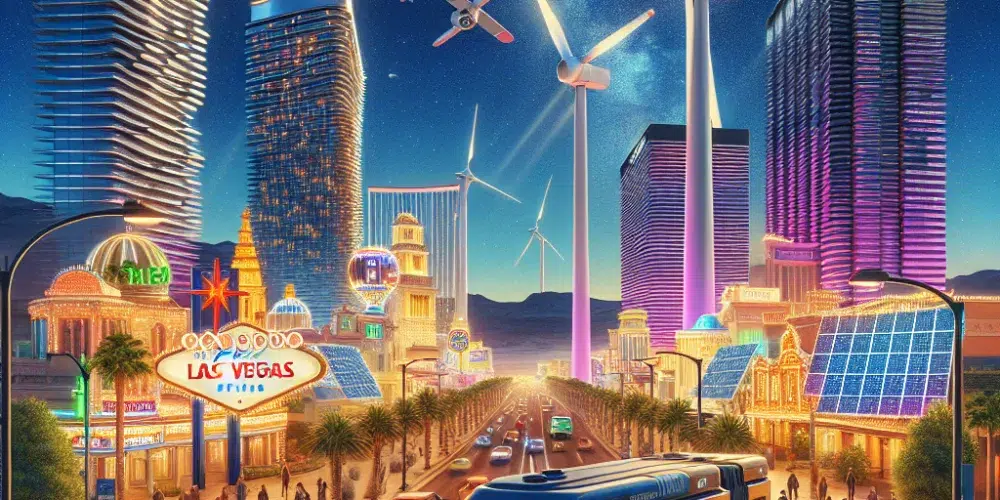Las Vegas, NV – In an innovative shift in the gambling and entertainment industry, major casinos on the Las Vegas Strip are making significant strides towards environmental sustainability. This groundbreaking development is not only set to revolutionize the iconic Strip but also positions Las Vegas as a leader in eco-friendly tourism practices worldwide.
The pioneering initiative, led by some of the most prominent names in the casino industry, includes a comprehensive range of sustainability measures aimed at reducing carbon footprints and promoting green energy. Among the frontrunners in this green revolution are The Venetian Resort, MGM Resorts International, and Wynn Resorts, each launching their ambitious programs to tackle the urgent demands of climate change.
The Venetian Resort has announced its plan to be fully powered by renewable energy sources by the end of 2024. Their strategy includes installing solar panels over vast expanses of parking structures and utilizing geothermal energy for heating and cooling purposes. “Our commitment to the environment goes beyond compliance; it’s about setting a new standard for the gaming and hospitality industry,” stated the Chief Sustainability Officer at The Venetian.
MGM Resorts International has taken a different approach by focusing on water conservation practices alongside energy efficiency. The company has successfully reduced its water usage by 33% compared to its consumption a decade ago and is now investing in advanced water recycling systems. MGM’s latest project involves transforming all its properties’ lighting to LED, which not only consumes less energy but also significantly lowers heat emission thereby reducing air conditioning requirements.
Wynn Resorts is not far behind, having launched a multi-faceted sustainability program that emphasizes zero waste to landfill by 2030. Their strategy includes comprehensive recycling, food waste composting, and a ban on single-use plastics across all operations. Furthermore, Wynn is developing a biodiversity program that includes the creation of bee habitats and butterfly gardens to enhance local ecosystems.
This sustainable push is also seeing support from Nevada’s policy makers. Recent legislation passed in Nevada aims to provide incentives for businesses that implement green practices, offering tax breaks and subsidies for those who qualify. This has opened the door for other small and medium-sized enterprises on the Strip to adopt similar environmental standards.
Industry experts believe that this move towards sustainability is not just a trend but a business imperative. “The global visitor is becoming more environmentally conscious,” explains a professor of hospitality at the University of Nevada, Las Vegas. “Las Vegas is adapting to these changing consumer behaviors to stay relevant and competitive.”
These initiatives by Las Vegas casinos are set to create a ripple effect across the global casino and gaming industry, with implications that reach far beyond the neon lights of the Strip. As these practices become more mainstream, they could set new benchmarks for environmental responsibility in the sector.
Furthermore, these changes are likely to enhance Las Vegas’ appeal as a tourist destination among eco-conscious travelers, promoting a more sustainable form of tourism. This shift could potentially serve as a model for other entertainment capitals around the world, from Macau to Monte Carlo, demonstrating that economic success in the gaming industry can go hand in hand with environmental stewardship.
In conclusion, the Las Vegas Strip is betting big on sustainability, and this bet might just pay off by not only preserving the planet but also by paving the way for a new wave of profitable, eco-friendly tourism. As more casinos join this green revolution, Las Vegas could indeed transform from a city known for its bright lights to one celebrated for its big green initiatives.

David Garato is a luminary in gaming journalism, renowned for peeling back the curtain on the gaming world with his witty and insightful commentary. A decade into weaving stories from the pixelated edges of indie games to the expansive universes of AAA titles, David’s work is a thrilling blend of analysis and adventure. When not writing, he’s live-streaming, sharing his gaming exploits with an engaged and growing audience. David doesn’t just write about games; he lives them, making him a trusted guide in the gaming community.


